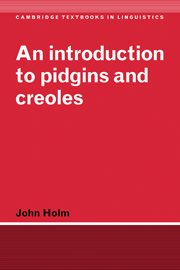7 - Conclusions
Published online by Cambridge University Press: 05 June 2012
Summary
The following is a brief assessment of the theoretical implications of the social and linguistic data in this volume.
Regarding the terminology, theories and sociohistorical data discussed in chapters 1 to 3, we can conclude that sociolinguistic factors are essential parts of the definition of both pidgins and Creoles. While one could draw up a list of structural features shared by most of the Atlantic Creoles (cf. chapters 5 and 6), few would claim that these could be used to determine that a language is a Creole without reference to its sociolinguistic history.
The validity of the theories put forward to explain the genesis and development of pidgin and Creole languages crucially depends on whether these theories can satisfactorily take into account the many, various and complex sociolinguistic circumstances under which the known pidgin and Creole languages came into being and developed. The social history of the speakers of the seven pidgin and Creole languages surveyed in chapter 3 casts light on some of the major issues, particularly in the context of the broader survey in Holm (1988–9, vol. II). These issues include nativization and the role it plays in determining the structural complexity of Creoles as opposed to the relative structural simplicity of pidgins. Another primary factor in defining pidgins has been their stability, but it now appears that this is irrelevant to the likelihood of a pidgin becoming a Creole. While stability enables us to distinguish pidgins from jargons or pre-pidgin continua, creolization appears to depend instead on social factors, with either pidgins or jargons providing adequate input.
- Type
- Chapter
- Information
- An Introduction to Pidgins and Creoles , pp. 237 - 240Publisher: Cambridge University PressPrint publication year: 2000



